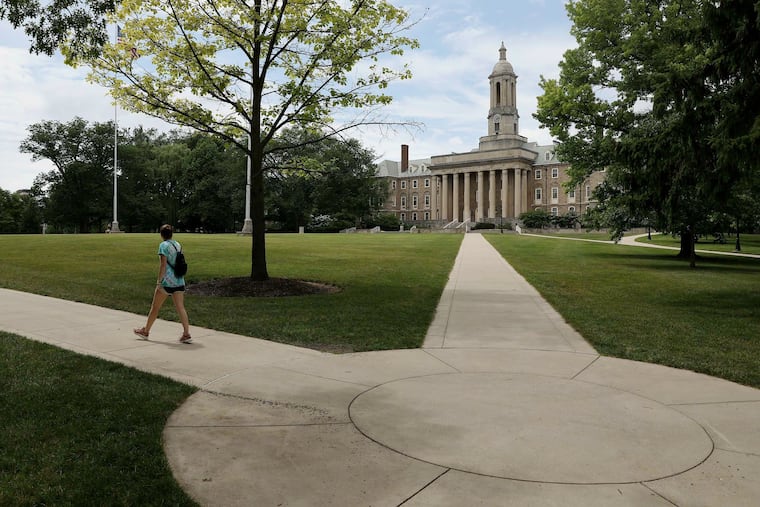Penn State may ask for historic 47% increase in state funding
If approved by the full board Friday, the plan would raise the general appropriation from $242 million to $357 million.

No question, it would be a historic ask.
Pennsylvania State University would seek a whopping 47%, or $115 million, increase in state funding for 2023-24 under a plan endorsed by a committee of board members Thursday afternoon.
If approved by the full board Friday, the plan would raise Penn State’s general appropriation from $242 million to $357 million.
The request — which would be the first to go to the legislature under new president Neeli Bendapudi — follows three years of flat funding in Penn State’s basic appropriation, though the university got a one-time 5% boost last year via stimulus funds.
» READ MORE: You may soon be able to buy a beer at Penn State football games
And it also comes after a hiring freeze put in place by the university earlier this year as it faced a $191 million general fund deficit, which the school said resulted in part from inflation, pandemic-related enrollment, and revenue strain and tuition freezes. The deficit has since been reduced to $149 million in the university’s revised budget proposal of $8.6 billion for the current year, according to information presented at the finance, business, and capital planning committee meeting Thursday. The full board also will vote on the budget plan Friday.
Zack Moore, Penn State’s vice president for government and community relations, said the request merely reflects what Penn State thinks the university deserves. A university analysis shows that it receives less per-pupil funding than other state and state-related universities, he said.
Penn State gets $5,608 per Pennsylvania undergraduate, compared with $8,275 at Temple University, $8,378 for universities in the Pennsylvania State System of Higher Education (PASSHE) and more than $9,049 for the University of Pittsburgh, he said. Penn State enrolls 43,000 Pennsylvania undergraduates.
“We don’t believe our elected officials have ever really thought about it this way before,” Moore said. “Our students deserve as much as other public university students in the state.”
» READ MORE: Penn State's new president Neeli Bendapudi on her early priorities — and some personal favorites
If approved, Penn State’s per-Pennsylvania-student allocation would reach that of Temple’s, he said.
“The operative word is fairness,” Bendapudi said before the board committee gave the proposal unanimous support.
Just what kind of reception the ask would get in Harrisburg is unclear. Republican lawmakers last June attempted to hold up funding for the four state-related universities, including Penn State, unless each agreed to swear under oath they would not use fetal tissue from an elected abortion for research. The issue stemmed from continued complaints from abortion opponents that Pitt conducts such research. The schools’ funding, however, was passed without such a requirement.
At the same time, the legislature awarded Pennsylvania’s state university system a historic increase in state funding, which the system had sought. PASSHE received more than a 15% increase, or $75 million, in its basic allocation, allowing the schools to freeze tuition for a fourth consecutive year.
The system’s universities are West Chester, Cheyney, East Stroudsburg, Kutztown, Millersville, Slippery Rock, Shippensburg, Indiana, the newly combined Bloomsburg, Mansfield and Lock Haven and the newly combined Clarion, California and Edinboro. They are different from Penn State and other state-related universities in that they are fully public and fully subject to Pennsylvania’s Right to Know Law.
» READ MORE: Citing inflationary increases, Penn State hikes room and board costs for next year
“We did recognize that obviously,” Moore said of PASSHE’s large funding increase, but he emphasized that PASSHE’s approach did not drive Penn State’s decision to ask for such a large increase.
“It wasn’t about any other university,” he said, but rather “what we thought was a matter of fairness.”
If approved, he said, Penn State would freeze tuition for Pennsylvania residents next year, as well as pump more money into financial aid for lower-income students. The university hiked tuition 5% for Pennsylvania residents at its main University Park campus this year and raised room and board costs 3.5%, citing “unprecedented inflation for food costs and utilities.”